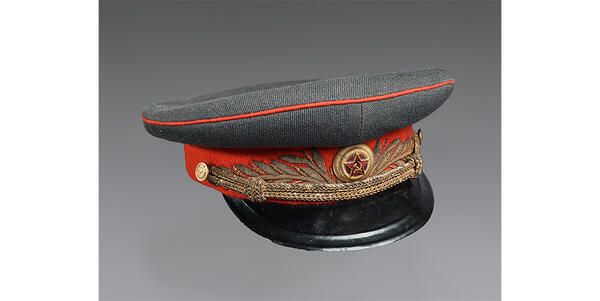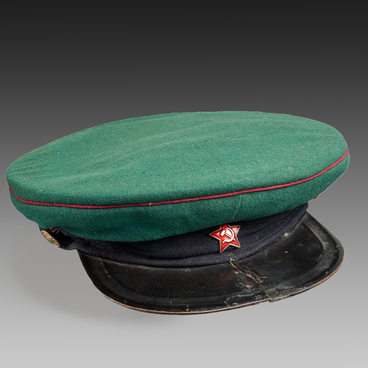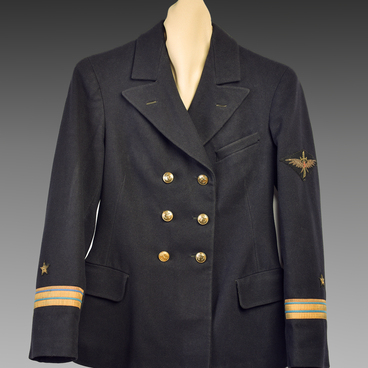The exhibition presents a ceremonial peaked cap, which belonged to the Hero of the Soviet Union Ivan Alferov. Alferov was born in 1897 in the Mysovskaya village, Vyatka province, today it has the name of the Luzsky district, the Kirov region.
Alfyorov went to the front of the Great Patriotic War in July 1941. He was appointed to the post of the 2nd Division Staff Commander of the National Militia, and soon he became the commander of the operational department of the headquarters of the 4th Army. Alferov took part in the Tikhvin defensive and Tikhvin offensive operations.
In May 1942, he was appointed commander of the 288th Infantry Division of the 4th Army of the Volkhov Front. Since September 1942, he became the commander of the 6th Guards Rifle Corps of the 2nd Shock Army of the Volkhov Front. In October–December 1942, the corps was relocated to the south, and it became part of the 1st Guards Army of the Southwestern Front. The corps took part in the Battle of Stalingrad under Alferov’s command.
In January 1944, Major General Alferov was appointed Commander of the 109th Rifle Corps, which under his leadership took part in the Leningrad-Novgorod, Narva, and Baltic offensive operations. Alferov’s 109th Rifle Corps was particularly successful in the Vyborg offensive operation. In June 1944, the units of the 109th corps were the first to break through the second line of the Finnish defense. As a result, the commander of the Leningrad Front, Marshal Leonid Govorov, launched the attack with two rifle corps simultaneously. In July of the same year, the soldiers under the Alferov’s command broke through the third line of defense, and on June 20 participated in the storm of Vyborg.
By the decree of the USSR Supreme Soviet Presidium dated June 21, 1944, Lieutenant General Ivan Alferov was awarded the title the Soviet Union Hero, the Order of Lenin, and the Gold Star medal for exemplary performance of combat missions of the command at the front of the struggle against the Nazi invaders and for the displayed courage and heroism.
Alfyorov went to the front of the Great Patriotic War in July 1941. He was appointed to the post of the 2nd Division Staff Commander of the National Militia, and soon he became the commander of the operational department of the headquarters of the 4th Army. Alferov took part in the Tikhvin defensive and Tikhvin offensive operations.
In May 1942, he was appointed commander of the 288th Infantry Division of the 4th Army of the Volkhov Front. Since September 1942, he became the commander of the 6th Guards Rifle Corps of the 2nd Shock Army of the Volkhov Front. In October–December 1942, the corps was relocated to the south, and it became part of the 1st Guards Army of the Southwestern Front. The corps took part in the Battle of Stalingrad under Alferov’s command.
He especially distinguished himself in The Srednedonsky operation in December 1942, which resulted in the defeat of the 8th Italian Army. Then Alferov’s corps participated in the Voroshilovgrad, Izyum-Barvenkov, and Donbas offensive operations, during which the soldiers liberated the cities of Boguchar, Millerovo, Gorskoye, and Dneprodzerzhinsk. Alfyorov handed over command of the corps and was recalled to Moscow in December 1943.
In January 1944, Major General Alferov was appointed Commander of the 109th Rifle Corps, which under his leadership took part in the Leningrad-Novgorod, Narva, and Baltic offensive operations. Alferov’s 109th Rifle Corps was particularly successful in the Vyborg offensive operation. In June 1944, the units of the 109th corps were the first to break through the second line of the Finnish defense. As a result, the commander of the Leningrad Front, Marshal Leonid Govorov, launched the attack with two rifle corps simultaneously. In July of the same year, the soldiers under the Alferov’s command broke through the third line of defense, and on June 20 participated in the storm of Vyborg.
By the decree of the USSR Supreme Soviet Presidium dated June 21, 1944, Lieutenant General Ivan Alferov was awarded the title the Soviet Union Hero, the Order of Lenin, and the Gold Star medal for exemplary performance of combat missions of the command at the front of the struggle against the Nazi invaders and for the displayed courage and heroism.



